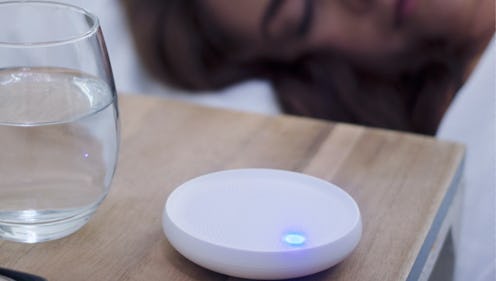Life
This Sleep Lamp Uses Metronome Lights To Lull You To Sleep Up To 2.5 Times Faster

Are you that extra sensitive person who absolutely cannot fall asleep unless the bedroom is pitch black, 67.4 degrees precisely, and totally silent? Do you wake up in the middle of the night to have a tinkle and then end up staring at the ceiling for the next hour because you can't get back to sleep? If so, the Dodow sleep light might be what you need. Supposedly, the battery-powered metronome light will help you fall asleep faster by taking you through an exercise that aligns your breathing with the light.
Exercise? When you're trying to sleep?! Calm yourself, because it's more soothing than it sounds — and simple. When the light expands, inhale. When the light shrinks, exhale. Easy peasy. You can choose from an eight-minute exercise or a 20-minute one, and the light will shut itself off when it's all over. In addition to the light, the machine also gives off a soft ticking sound. According to Firebox, where you can buy the light for just under $60.00, this little gadget can help some people fall asleep 2.5 times faster.
Firebox doesn't get into the nitty gritty of the science behind why and how the metronome light works, so I went searching for it myself. Sure enough, research has found by controlling your breathing in a certain manner, you can increase your chances of catching sound sleep. Let's explore.
Much of it goes back to your autonomic nervous system, which — as the name suggests — runs automatically. This system includes things like digestion, heart rate, and breathing. These things happens without you needing to consciously make them happen. What makes breathing unique, though, is that it's the one exception to the autonomic rule, explains Forbes, in the sense that while we do breathe without thinking, we can still control how we breathe, which can trigger other bodily changes — a trait the other processes don't possess. As an example, you can't really do much to control your own digestion. It just happens as your body needs it to.
When you slow your breathing, you put your body in a state more akin to rest and relaxation because it activates the vagus nerve, which then tells your body to chill the eff out. Once in a more relaxed state of mind (and body), you're better adapted to fall asleep and stay asleep.
Sound like a lot of nonsense? That's not looking to be the case. Speaking to Forbes, Patricia Gerbarg, Ph.D., co-author of The Healing Power of the Breath, suggests slowing down your breathing to somewhere between four-and-a-half to six full breaths per minute, for maximum relaxation of the body and mind.
It doesn't end there. A study published in Psychiatric Clinics of North America states breathing is connected to all major networks involved in processes like emotion regulation and cognition. In other words, your breathing has the power to affect many other things going on in your body. Furthermore, it says specific breathing patterns have been shown to help reduce depression, stress, anxiety, and — wait for it — insomnia.
Since we were youngsters, we've been told to take a deep breath to help us calm down when we're feeling worked up — sad, angry, stressed, whatever. It always seemed like a load of hooey to me, but maybe I didn't give it enough credit. After all, look at something like yoga, which encourages mindful breathing. What's one of the best parts of yoga? It helps you relax. Coincidence? Probably not.
So, could the Dodow sleep light work simply by serving as a guide for slower, more patterned breathing, which in turn helps you calm down so you can drift off to sleep? Quite possibly! Could you also potentially just slow down your breathing and do it on your own? Again, quite possibly.
If you'd like a little extra help getting to a sleepy state, the Dodow light is available on Firebox and Amazon.